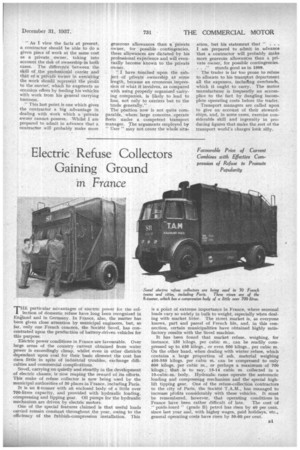Electric Refuse Collectors Gaining Ground in France
Page 13

If you've noticed an error in this article please click here to report it so we can fix it.
Favourable Price of Current Combines with Effective Compression of Refuse to Promote Popularity THE particular advantages of electric power for the collection of domestic refuse have long been recognized in England and in Germany. In France, also, the matter has been given close attention by municipal engineers, but, so far, only one French concern, the Societe Sovel, has concentrated upon the production of battery-driven vehicles for this purpose.
Electric power conditions in France are favourable. Over large areas of the county current obtained from water power is exceedingly cheap, whilst even in other districts dependent upon coal for their basic element the cost has risen little in spite of industrial troubles, exchange difficulties and commercial complications.
Sovel, carrying on quietly and steadily in the development of electric chassis, is now reaping the reward of its efforts. This make of refuse collector is now being used by the municipal authorities of 30 places in France, including Paris.
It is an 8-tonner with an enclosed body of a little over 700-litres capacity, and provided with hydraulic loading, compressing and tipping gear. Oil pumps for the hydraulic mechanism are driven by electric motors.
One of the special features claimed is that useful loads carried remain constant throughout the year, owing to the efficiency of the fribbish-compression installation. This is a point of extreme importance in France, where seasonal loads vary so widely in bulk to weight, especially when dealing with market litter. The street market is, as everyone knows, part and parcel of French life, and, in this connection, certain municipalities have obtained highly satisfactory results with the Sovel machine.
It has been found that market refuse, weighing, for . instance, 150 kilogs. per cubic m., can be readily compressed up to 450 kilogs., or even 500 kilogs., per cubic m. On the other hand, when dealing with winter refuse, which contains a large proportion of ash, material weighing 450-550 kilogs. per cubic m. can be compressed to only 600 kilogs. per cubic m., or perhaps a maximum of 700 kilogs.; that is to say, 13-14 cubic in. collected in a 10-cubic-rn. body. Hydraulic rams operate the automatic loading and compressing mechanism and the special highlift tipping gear. One of the refuse-collection Contractors to the city of Paris, the Societe T.A.M., has managed to increase profits considerably with these vehicles. It must be remembered, however, that operating conditions in France have been rather difficult of late. The cost of " poids-lourd " (grade B) petrol has risen by 40 per cent. since last year and, with higher wages, paid holidays, etc., general operating costs have risen by 50-80. per cent.
































